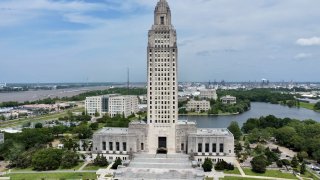
Louisiana’s Republican-dominated Legislature overturned Democratic Gov. John Bel Edwards’ recent veto of a ban on gender-affirming care for transgender minors on Tuesday.
Louisiana, where the ban is scheduled to go into effect Jan. 1, 2024, will join 20 other states that have enacted laws restricting or banning gender-affirming medical care, which includes puberty-blockers, hormone treatment and gender-reassignment surgery. Most of those states face now lawsuits, and in some places the bans have been temporarily blocked by federal judges.
Like statehouses across the country, for the last three months Louisiana lawmakers have heard and held debates over gender-affirming care — something that has been available in the United States for more than a decade and is endorsed by major medical associations. Discussions over the ban were marred by misinformation, swarmed with religious arguments and saw hours of emotional testimony from the LGBTQ+ community
At one point, during the regular legislative session, the proposed ban was presumed dead after a Republican lawmaker cast a tie-breaking vote to kill the bill. However, amid pressure from Louisiana Attorney General Jeff Landry and the Republican Party of Louisiana, the bill was resurrected and passed.
Gov. Edwards used his power to veto the bill, but in return the GOP-led Legislature gathered at the Capitol Tuesday for a one-day veto session — only the third such session since 1974. This is the second successful override — the only other being last year when lawmakers overturned Edwards’ veto of a congressional redistricting bill
Republicans maintain that they are trying to protect children, while opponents argue the bill would do the opposite, leading to heightened risks of stress, depression and suicidal thoughts among an already vulnerable group.
Get Tri-state area news delivered to your inbox.> Sign up for NBC New York's News Headlines newsletter.
In addition, supporters of the bill argued that the ban proactively addresses a problem that they fear could intensify — especially if minors from surrounding states, where there are bans, travel to Louisiana to seek gender-affirming care.
U.S. & World
“If we don’t pass this bill, Louisiana will become the destination for children across the entire South to undergo these life-altering and irreversible medical experiments,” Rep. Gabe Firment, the Republican who authored the bill, said.
Those in Louisiana’s LGBTQ+ community say gender-affirming care in the state is not as easily accessible as conservatives make it seem and the problem being presented is unfounded in the state.
“Proponents of this bill suggest that (the legislation is) necessary to stop physicians from attacking our children by performing these sex change surgeries. This is simply not happening in Louisiana,” Rep. Jason Hughes, a Democrat, said Tuesday.
Hughes pointed out a report by the Louisiana Department of Health that showed just a few dozen minors received gender-affirming care between 2017 and 2021 and that there have been zero gender-affirming surgeries. The data only factored Medicaid-enrolled youths.
In order to override the governor, a two-thirds approval from both the House and Senate is required. The GOP currently holds a two-thirds majority in both chambers. The override had the votes needed, with a few Democrats siding with Republicans — turning the bill into law, pending any possible court battles that may block or delay the ban.
Louisiana joins a growing list of states that have enacted bans. But opponents say they are confident that courts will find the laws unconstitutional and strike them down — similar to what has been seen in Arkansas, Alabama and Indiana.
Louisiana lawmakers also attempted to overturn two other controversial LGBTQ+ bills that Edwards vetoed; a “ Don’t Say Gay ” bill that broadly bars teachers from discussing gender identity and sexual orientation in public school classrooms; and a measure requiring public school teachers to use the pronouns and names that align with what students were assigned at birth. Both attempts were unsuccessful and as a result will not become law.
Louisiana’s culture divide over LGBTQ+-related legislation echoes what has been seen in GOP-led statehouses across the country. Bills targeting transgender people have topped conservative agendas, and LGBTQ+ advocates say a dangerous and blatant attack is happening on their community. This year alone, more than 525 anti-LGBTQ+ bills were introduced in 41 states, according to data collected by the Human Rights Campaign, a gay rights organization.



